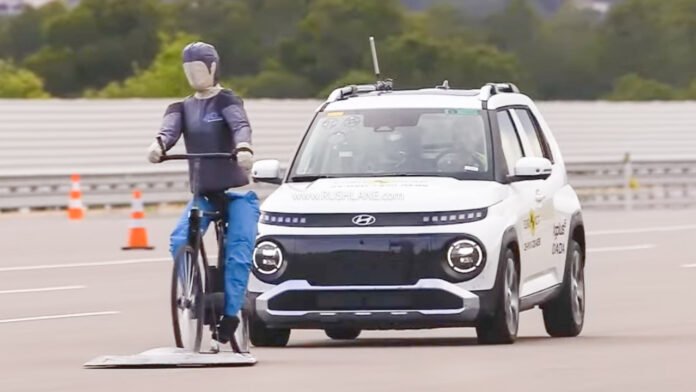Hyundai’s new electric car, known for its strength and credibility around the world, recently participated in the Euro NCAP crash test and from there it received a 4-star safety rating. Although many of its security standards proved to be very strong, due to some important flaws, the vehicle missed out on scoring the highest security category of 5-star. This crash test report made it clear that Hyundai Instar Ev is a balanced and safe option, but there is still some scope for improvement.
Better score than average in adult safety
According to the Test conducted by Euro NCAP, Hyundai Instner EV received a total of 70% score for adult Occupant Protection. Its performance was satisfactory in frontal and side impact tests. The test found that in the front collision, the vehicle provided adequate protection for both the driver and the passenger, but the driver’s chest recorded a slight decrease in the security. In addition, the effectiveness of the head airbag was also found to be completely reliable.
Also Read: Tesla Model Y Launch in India – Full details of price, range and features
Also, opening the driver’s door at the time of crash made a large safety concen, which affected the rating. In the Test, it got 11.3/16 in the front impact, 3.5/4 marks in the rear impact.
Commendable demonstration in children’s safety
The performance of Hyundai Instar Ev in case of children’s safety was quite strong. It got a total score of 81%. It proved better security in the tests conducted for children’s dummy in crash simulation, especially in side impact.
In this section, the Indes got 22.1/24 marks in crash performance, 6/13 marks for Safety features and 12/12 marks in CRS (Child Restraint System) installation test. This means that the car is reliable in safety of children and ensuring the correct position of their seat.
Balanced security for weak road users
Hyundai Inster EV scored 70% marks in the test conducted for vulnerable road users. In this test, the vehicle is tested for AB (Autonomous Emergency Braking) technique, which automatically applies brakes in view of pedestrians and bicycle riders. The AEB system reacted at the right time through front sensors, preventing the possible collision. However, the front bonnet design of the car was unable to keep the pedestrians completely safe, causing the score to be slightly lower in this category.
Average score found in safety assist technology
Hyundai Inster EV received a 67% score for safety assist ie safety techniques during driving. This includes several major facilities of the Advance Driver Assistance System (ADAS) such as lane keep assist, driver fatigue warning, automatic emergency braking. Although the presence of these features is commendable, little improvement in their performance is expected to ensure even better security during driving.
Also Read: Booking of Vinfast VF6 and VF7 Electric SUV begins in India, launch potential in August 2025
Why did not get a 5-star rating?
There have been some clear reasons behind the Hyundai Instner EV not getting a 5-star rating. The most important reason was the opening of the driver’s door during the crash, which is considered a major omission in terms of safety standards. In addition, elements such as inadequate protection of the driver’s chest, limited effects of head airbags, and weak performance of body shell in side pole impact also affected the rating. The agency like Euro NCAP also assesses such small but important aspects in depth and for this reason the Instner EV had to be satisfied with the 4-star by giving a star low.
Safe but scope for getting better
Hyundai Instar Ev is emerging as a great electric car, which comes with great security features in its price range. Its 4-star Euro NCAP score shows that it is capable of keeping passengers safe in most of the collision conditions. However, if Hyundai Driver Side Airbags, Door Locking Mechanism and Side Poll Protection improves, then this vehicle next time the 5-star rating in Tests next time


